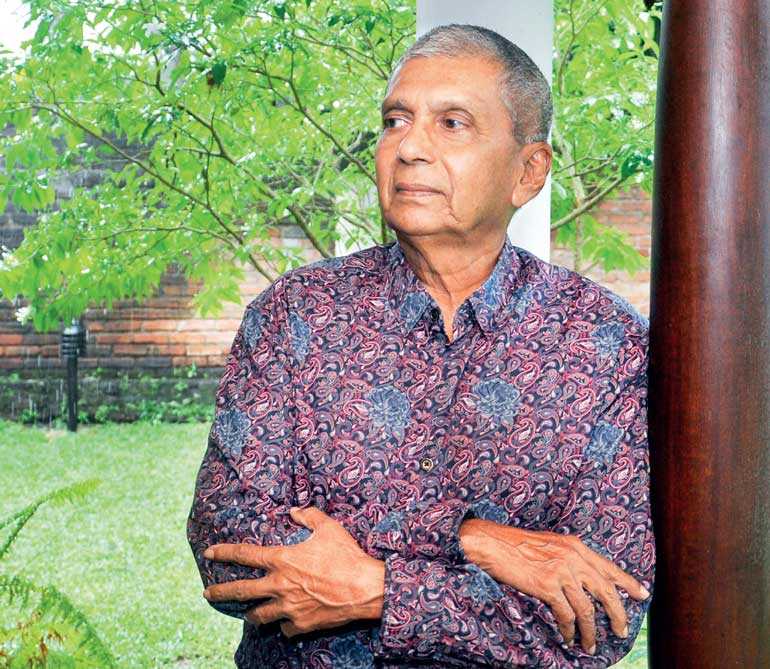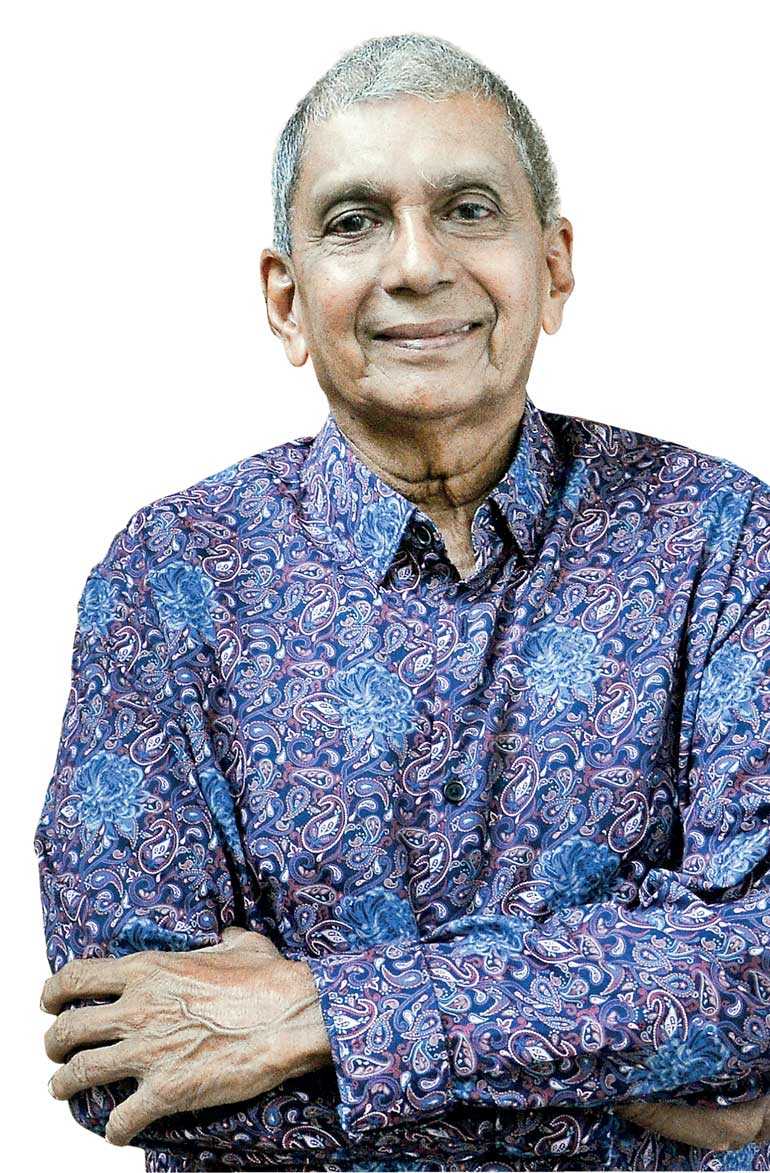Wednesday Feb 18, 2026
Wednesday Feb 18, 2026
Thursday, 25 October 2018 00:00 - - {{hitsCtrl.values.hits}}
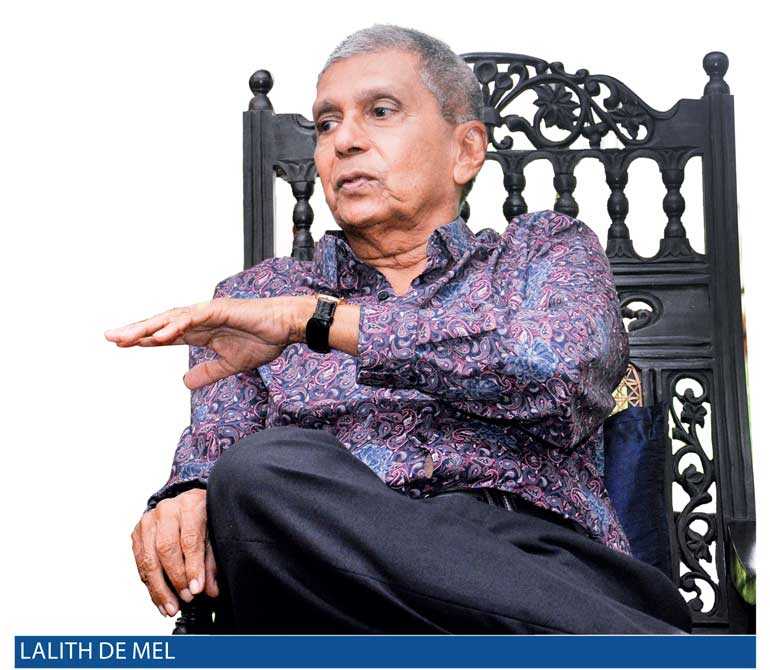
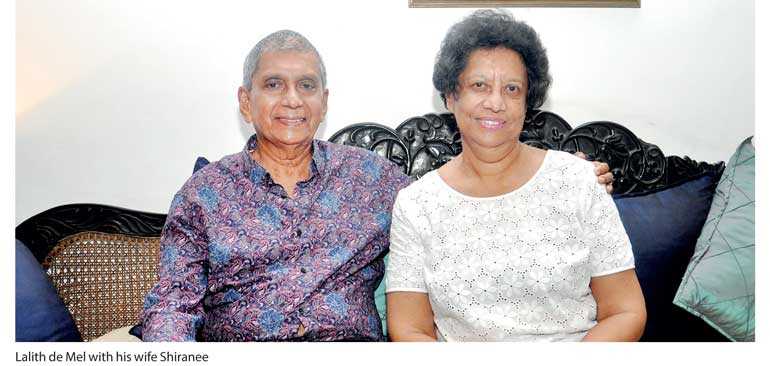

Having made Sri Lanka proud over many, many years – reaching the pinnacle as the first Sri Lankan on the Main Board of a Top 100 Company in the UK and serving on the boards of 27 companies abroad and 11 companies in Sri Lanka with steady success – top corporate leader Lalith de Mel retired recently after a long and successful innings. Here, he talks to Daily FT about his remarkable journey:
Q: To start off, could you go back to the early days and tell us about your family, your childhood and school life?
A: I really enjoyed my school life and I was sorry when it ended. I took part in every aspect of school life, played virtually every game for my house, I was a good athlete and played badminton and rugby for the school. I was Editor of the school paper ‘New Horizons,’ i started a jazz band called the Bohemians, was a house captain and a school prefect.
Q: Soon enough it was time to go off to Cambridge, in keeping with family tradition. How would you describe your university life?
A: I went to Cambridge reluctantly. I was pushed by my father as it was a family tradition for the boys to go to the UK for their university education. But when I got to Cambridge I was fascinated from the start. It was a brilliant experience. I did the Economics Tripos, a challenging degree, but that was just a part of the experience. Cambridge had numerous societies and through them I found likeminded friends and spent many hours with them, drinking coffee, sipping sherry or drinking pints of beer in pubs. That was the very pleasant way in which we developed our minds by probing the ideas and thoughts that interested us.
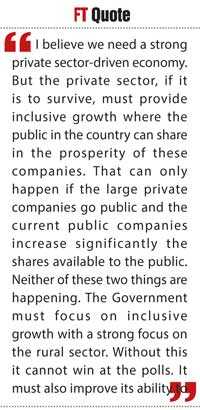
Q: After graduating at 21, you returned to Sri Lanka and joined Shell Company of Ceylon. Could you outline the Shell experience?
A: Shell was a top level multinational. They had process manuals for everything and I learnt to think in a highly-disciplined manner. It was also my first exposure to marketing, which became my core discipline in my working career. They had the theory that a person perceived as a potential high flyer had to be tested in two different disciplines. So I had three years in Marketing and then two years in Finance. I passed the test and I was destined to be posted to another country when I left to join Reckitt and Colman.
Q: After five years at Shell, you were offered a position at Reckitt & Colman of Ceylon, which was setting just up the business here, kicking off your long journey with the company. Could you tell us about the early days?
A: Reckitt and Colman was like getting into the sweet shop. I was the Head of Marketing and they had started local manufacture and I had to launch their famous global brands. The new product launches worked out well, and from the start the company was profitable and the foreign investors were pleased.
Q: At 32 you were posted to Brazil as a member of the Management Team and at 33 you became the Managing Director of Reckitt & Colman Company in Sri Lanka, returning here at a difficult time with the JVP uprising and a challenging economic environment. How did you manage it?
A: We had some great brands and some were essential products like Disprin and Dettol, so we managed to get the licenses for raw materials. I refused to be intimidated by the Marxists in the Government who wanted us to be contract manufacturers for the State Pharmaceutical Corporation. I ignored the air of uncertainty in the country. As we had products that people would buy, we managed to be profitable and kept hoping for a change in government.
Q: At 38, you were Chairman of a multinational subsidiary; at 40, a Regional Director at Corporate Headquarters in London. Then at 53, you were appointed as a Main Board Director of Reckitt & Colman PLC – a huge achievement. How did it feel to become the first Sri Lankan on the Main Board of a Top 100 Company in the UK and how would you describe the journey to get there? 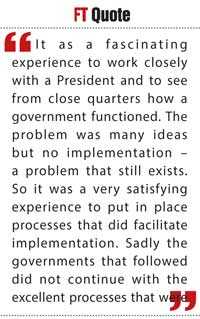
A: The journey to the top was a tough challenge. British companies were managed by Brits. From the time I was appointed a Regional Director to when I got on the Main Board, I was the only outsider. There were no other non-Brits. I always hit my targets, and then the colour of the deliverer of good results became opaque. This eased my journey through the glass ceilings to the Main Board. I was delighted that a small brown man (I am 5’4”) from Sri Lanka had made it to the Main Board of a famous British multinational company.
Q: Back in Sri Lanka, President Chandrika Kumaratunga wanted you to help her Government and you took on many roles, propelled by a desire to help your country. You were appointed Sri Lanka Telecom Chairman, BOI Head, Head of the special unit to facilitate the implementation of projects, Senior Advisor to the Ministry of Finance, and you were also instrumental in the operations of the National Procurement Council, National Council for Economic Development and State Enterprise Management Agency. How would you describe the experience?
A: It was a fascinating experience to work closely with a President and to see from close quarters how a government functioned. The problem was many ideas but no implementation – a problem that still exists. So it was a very satisfying experience to put in place processes that did facilitate implementation. Sadly the governments that followed did not continue with the excellent processes that were put in place during President Kumaratunga’s regime.
Q: At the same time you were also called upon to assist the private sector, starting with an invitation to join the John Keells Holdings Board, which you accepted. How was the private sector experience?
A: I wanted to share my knowledge and experience with the private sector companies and that was a satisfying experience. I also wanted to help private family companies to become good public companies. That was a struggle at times as family companies were instinctively loath to relinquish control.
Q: In the course of your career you have been on the boards of 27 companies abroad and 11 companies in Sri Lanka – a long and successful innings, indeed. What is your advice to corporate Sri Lanka and to the Government of Sri Lanka?
A: I believe we need a strong private sector-driven economy. But the private sector, if it is to survive, must provide 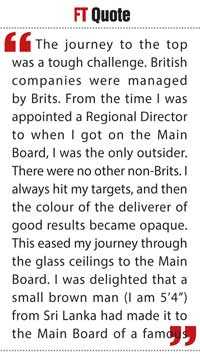 inclusive growth where the public in the country can share in the prosperity of these companies. That can only happen if the large private companies go public and the current public companies increase significantly the shares available to the public. Neither of these two things are happening.
inclusive growth where the public in the country can share in the prosperity of these companies. That can only happen if the large private companies go public and the current public companies increase significantly the shares available to the public. Neither of these two things are happening.
The Government must focus on inclusive growth with a strong focus on the rural sector. Without this it cannot win at the polls. It must also improve its ability to implement ideas. At present its implementation record is poor.
Q: What would you say were the key personality characteristics that helped in your remarkable journey and drove you forward?
A: I worked hard at understanding the businesses that I had to manage. Then I formed a clear view on the way forward and had total confidence in my view. I coaxed my mangers to take ownership and believe that my plans were theirs. I was always sensitive to the emotions of others who were involved or affected.
Q: You finally retired after working for 55 years. How is retirement treating you and what is a day in your life like today?
A: I have really enjoyed retirement. I have been able to spend quality time with my wife and have done a lot of leisurely travel in Europe. It is nice to see the grandkids growing up and to go for their cricket and football matches and plays. I have also been busy enjoying the nice things in life – spending evenings with friends with a bottle of wine and sorting out the world, seeing a new play, reading a nice book, listening to some nice music, playing a round of golf, going to the races when in England, going to a nice restaurant with friends or family, etc. It is a busy life! I wish I had retired many years ago.
Pix by Ruwan Walpola
